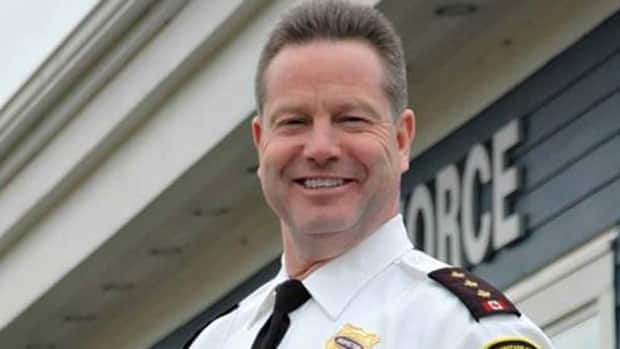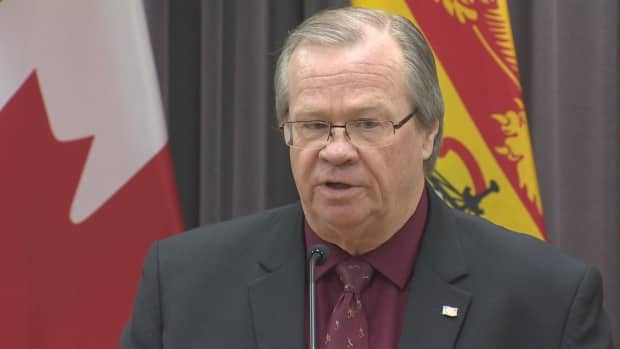Police Act overhaul pending in wake of KV officer who retired amid sexual harassment allegations

(Facebook)
The New Brunswick Police Act is poised for a major overhaul that could, among other things, shorten the time it takes to deal with disciplinary hearings for officers.
The Department of Public Safety held stakeholder sessions last month and is "getting ready to present proposed changes to government," said spokesperson Coreen Enos.
"The discussions focused on all aspects of the Police Act including disciplinary proceedings," she said in an emailed statement, without elaborating.
There are 58 proposed changes, according to Bob Davidson, executive director of the New Brunswick Police Association, and the parties agree on almost all of them, except the ones dealing with officers being suspended without pay.
Davidson believes the case of former Kennebecasis Regional Police Force Insp. Jeff Porter — what he describes as "the Porter fiasco" — has been "the elephant in the room."
That's why the association is calling on the government to hold an inquiry into the case before making any amendments.
"This Porter case, it's a very unusual, one-off situation," said Davidson. "So we've got to be careful that we don't change legislation based on knee-jerk reactions to a very abnormal … situation."
Porter, whose full name is Herman Jeffrey Porter, was suspended with pay for more than four years pending the outcome of a conduct complaint over alleged sexual harassment and other Police Act offences involving a female civilian employee he supervised.
He was subsequently accused of three more offences related to alleged retaliation against the complainant.
After various delays, including a failed legal challenge by Porter last February, he was scheduled to face an arbitration hearing before the New Brunswick Police Commission on Oct. 26.
A few days prior to the hearing, Porter gave notice he planned to retire at the end of the year and the hearing was adjourned until Dec. 31.

That hearing was unable to proceed because the provincial policing disciplinary body only has authority over active police officers.
The case cost local taxpayers more than $1 million, Quispamsis Mayor Gary Clark has said.
A Right to Information request filed by CBC News revealed Porter worked as a supply teacher while he was suspended with pay amid the sexual harassment allegations. He was employed with the Anglophone South School District from September 2019 to February 2020.
Porter has a bachelor of education with a major in physical education, according to the website of the KV Judo Club he co-founded in 1995.
He also continued to serve as a sensei with the club, which has students as young as five, according to the website.
"We certainly support the presumption of innocence for our police officers because they deal with clients to try to injure, maim, kill them and put in false complaints," said Davidson.
"But when you have a serious allegation like sexual harassment, which was the case with Porter, certainly he should not be working in any environment like schools or judos and things of that nature, clearly. Obviously, somebody was asleep at the switch at the school level to let him in a classroom."

On Oct. 30, Quispamsis and Rothesay councils sent a joint letter to Premier Blaine Higgs and Public Safety Minister Ted Flemming, calling for amendments to the Police Act that would see allegations against officers dealt with more quickly.
On Nov. 5, the police association, which represents the nine municipal force unions, asked Flemming to launch an inquiry into Porter's case, said Davidson.
"It was incumbent upon, we felt, the government, to have an independent investigation so that the taxpayers of Quispamsis and Rothesay and the province could see that it had nothing to do with the present suspension with pay [provision] under the Police Act," he said.
As it stands, municipal and regional forces cannot suspend an officer without pay, unless the officer has been found guilty in court or at an arbitration hearing.
Davidson contends suspension with pay is vital to front-line officers who may face false allegations by criminals, which can take years to defeat.
He envisions an independent inquiry similar to the one in 2019, when Alphonse MacNeil, a retired assistant commissioner with the RCMP, was hired to review the policies, practices and procedures of the New Brunswick Police Commission.
Flemming has not said whether he will launch an inquiry.
"We have the premier from Quispamsis, we have the minister of Public Safety from Rothesay, so we're hoping that the facts will prevail and that that fiasco there doesn't cause some sort of impetus to change the Police Act from the suspension with pay that's presently there," said Davidson.
'Speedier process'
In the meantime, the association agrees with the Quispamsis and Rothesay councils about the need for "a speedier process," he said.
It tabled a proposal during last month's stakeholder talks, which was agreed to by the two chiefs representatives, he said.
"So we would hope that the government respects that. I mean, if some bureaucrats or politicians think they know more than the frontline officers and chiefs of police, well, that's a sad situation."
The Police Act review began in 2015 and continued for two years before being shelved by the Department of Public Safety.
The stakeholders' committee came up with several major changes, including taking certain powers away from the commission and giving them back to the minister, and having mutually agreed upon arbitrators, according to Davidson.

The review was resurrected last month in the wake of news of Porter's retirement.
An in-person meeting was held, followed up by a video conference, with two representatives each from the police association, the New Brunswick Association of Chiefs of Police, the New Brunswick Police Commission, municipalities, and the province.
Kennebecasis Regional Police Force Wayne Gallant, who represented the chiefs with Miramichi Police Chief Paul Fiander, said they "are supportive of making updates" to the act and "appreciated the opportunity to be consulted."
"We will respect the process and defer any questions to the GNB on the consultations," Gallant said in an emailed statement.
He declined to comment on the Porter matter.

The New Brunswick Police Commission was pleased to participate in the stakeholder meetings, said executive director Jennifer Smith.
"We are encouraged by the work the department is doing to modernize the Police Act and their efforts to seek input from stakeholders. The commission will remain engaged in the process as a stakeholder."
She declined to discuss the matter any further, saying "the process belongs to" the Department of Public Safety.
The current Police Act was enacted in 2005 on unanimous agreement, said Davidson. It was updated in 2008.
Porter is at least the third officer in recent years to retire before facing possible disciplinary action.
Former Saint John Police Force deputy chief Glen McCloskey retired in April 2018, six months before he was scheduled to face an arbitration hearing related to Dennis Oland's first murder trial in 2015 in the bludgeoning death of his father, multimillionaire Richard Oland. Another officer alleged McCloskey had urged him not to reveal he had walked through the bloody crime scene. (Oland was found not guilty in 2019 after being retried by judge alone.)
And former Kennebecasis Regional Police Force chief Stephen McIntyre retired in 2016 after an independent investigator found he committed 23 breaches of various sections of the code of conduct by, among other things, failing "to ensure that the improper or unlawful conduct of Insp. Porter was not concealed."
None of the allegations have been proven.

